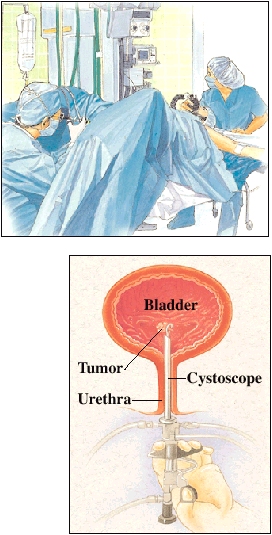Treating Bladder Cancer: TUR (Transurethral Resection)
During your evaluation, your doctor uses cystoscopy to look inside your bladder. If the cancer is in an early stage (superficial) and growing slowly (low grade), it may be removed using cystoscopy. Removal of a tumor during cystoscopy is known as transurethral resection (TUR). Most of the time, tissue removed during TUR can be studied to see if more treatment is needed.

Removing a Tumor
TUR is usually done in a hospital as an outpatient procedure. If the tumor is large, you may be kept in the hospital overnight. You will be given anesthesia so you don't feel pain during the procedure. Regional anesthesia numbs just the lower part of your body. If you have general anesthesia, you will be completely asleep.
During the Procedure
A cystoscope containing a cutting tool is inserted into your bladder through your urethra. The bladder is then examined. If tumors are found, they are removed, if possible. A biopsy (sample) of both tumor and normal-looking tissue may be taken. These samples are looked at under a microscope for cancer cells. In some cases, a laser is used to burn a tumor away. The laser destroys tissue, so none is left for biopsy.
After the Procedure
After the procedure, a catheter (flexible tube) may help drain your bladder for a few days. Bladder tumors can come back (recur) after treatment. To be sure that all cancer cells are destroyed, TUR may be followed by other types of treatment, such as intravesical therapy. This uses special medications that are placed in the bladder to destroy cancer cells.
Risks and Possible Complications












